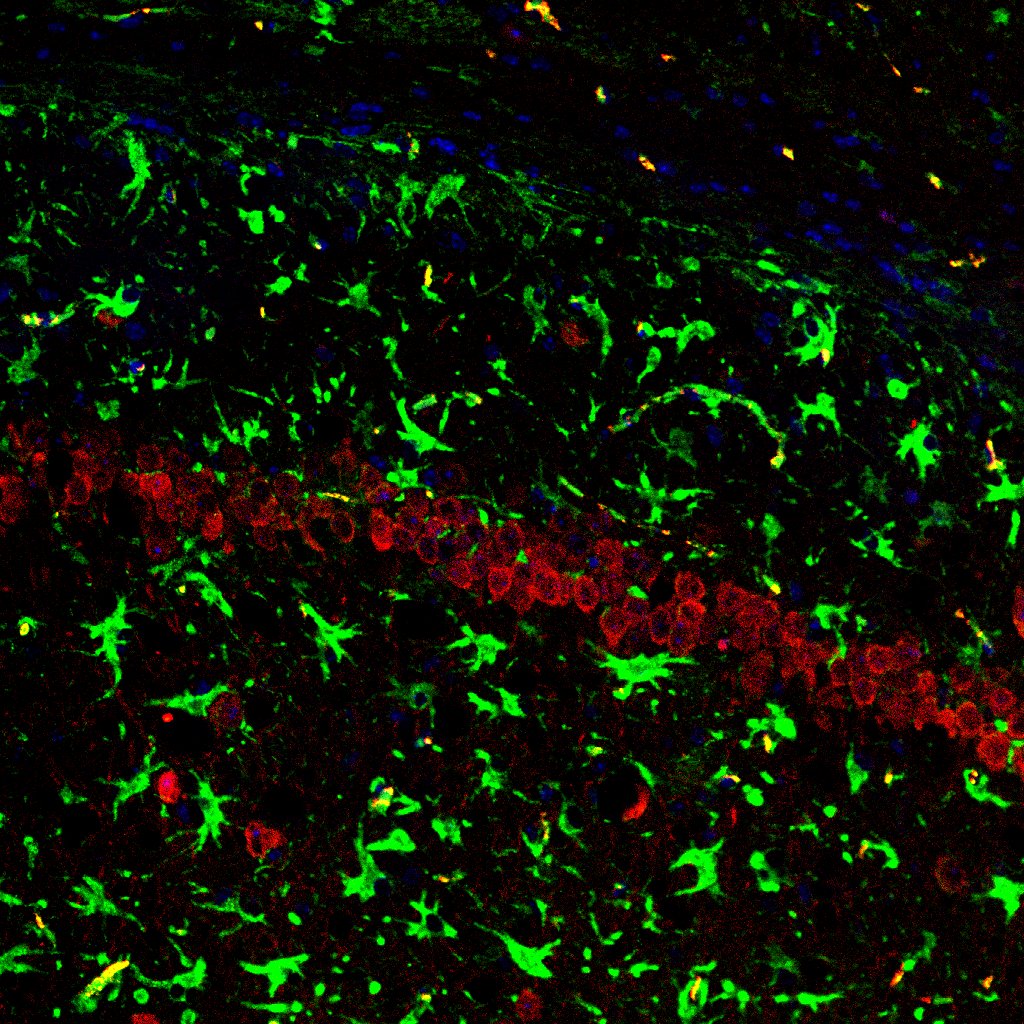Thursday, 04 March 2021
Scientists from the University of Nottingham have discovered a treatment that could potentially help to slow down the progression of neurodegenerative conditions such as Alzheimer’s disease.
Diseases associated with old age, including Alzheimer’s disease and other forms of dementia, are increasing in prevalence and, although symptomatic treatments exist, a cure to prevent progression of the disease has yet to be found.
This new study, which is published in the journal PNAS and led by Dr Joern Steinert from the School of Life Sciences at the University of Nottingham, could mean that patients with these conditions could live healthier and longer lives.
Neurodegenerative diseases are associated with various abnormal neuronal functions in the brain, which are related to misfolding proteins, such as amyloid beta detected in Alzheimer’s disease.
 The image shows in red, the neurons of the hippocampus, in blue, all cells which are in this part of the brain and in green, cells called astrocytes which are in high density and are responsible for the observed increase in neuroinflammation.
The image shows in red, the neurons of the hippocampus, in blue, all cells which are in this part of the brain and in green, cells called astrocytes which are in high density and are responsible for the observed increase in neuroinflammation.
In this new research, the team of experts used a mouse model to study a specific angle of this type of disease caused by the misfolding prion protein. Prions are tiny proteins that, for unknown reasons, misfold in a way that damages healthy brain cells. You can have them for many years before you notice any symptoms.
Prion diseases such as Creutzfledt Jakob disease in human or mad cow disease (Bovine Spongiform Encephalopathy [BSE]) cause a type of dementia that progresses unusually fast in contrast to Alzheimer's disease. Different genes and proteins are involved in both diseases but leading to a similar outcome.
One reason why neurons die in these diseases is because of the body’s aggressive internal immune response to the misfolding prion protein, which is called neuroinflammation.
In order to prevent the neurons from dying, the team used a specific treatment, which inhibits this aggressive immune response by blocking an enzyme called nitric oxide synthase.
By blocking this enzyme over three weeks in mice with the disease, the team showed that the neurons life was prolonged, they stayed healthier and the process of prion misfolding was reduced.
By blocking the enzyme nitric oxide synthase in this particular disease, we saw incredible results, which gives us hope that a treatment might also be beneficial to supress certain aspects of other neurodegenerative disease.”
The team will now specifically test if this treatment is also effective in other forms of dementia, specifically in Alzheimer’s disease and will study the exact details of this neuroinflammation process.
The full study, which was funded by the Medical research Council UK, can be found here.
Story credits
More information is available from Dr Joern Steinert from the School of Life Sciences at the University of Nottingham at Joern.Steinert@nottingham.ac.uk
Notes to editors:
About the University of Nottingham
Ranked 97 in the world and 17th in the UK by the QS World University Rankings, the University of Nottingham is a founding member of Russell Group of research-intensive universities. Studying at the University of Nottingham is a life-changing experience, and we pride ourselves on unlocking the potential of our students. We have a pioneering spirit, expressed in the vision of our founder Sir Jesse Boot, which has seen us lead the way in establishing campuses in China and Malaysia - part of a globally connected network of education, research and industrial engagement.
Nottingham was crowned Sports University of the Year by The Times and Sunday Times Good University Guide 2024 – the third time it has been given the honour since 2018 – and by the Daily Mail University Guide 2024.
The university is among the best universities in the UK for the strength of our research, positioned seventh for research power in the UK according to REF 2021. The birthplace of discoveries such as MRI and ibuprofen, our innovations transform lives and tackle global problems such as sustainable food supplies, ending modern slavery, developing greener transport, and reducing reliance on fossil fuels.
The university is a major employer and industry partner - locally and globally - and our graduates are the third most targeted by the UK's top employers, according to The Graduate Market in 2024 report by High Fliers Research. Alongside Nottingham Trent University, we lead the Universities for Nottingham initiative, a pioneering collaboration between the city’s two world-class institutions to improve levels of prosperity, opportunity, sustainability, health and wellbeing for residents in the city and region we are proud to call home. More news…